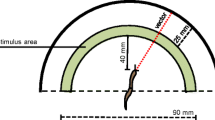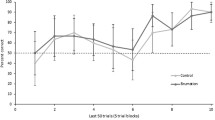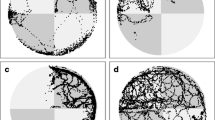Abstract
An opaque screen moving overhead elicits an escape response in the crab Chasmagnathus that after a few presentations habituates for a long period (long-term habituation). Two types of long-term habituation were previously described: the (context-signal)-long-term habituation yielded by spaced training – context dependent, cycloheximide sensitive and long lasting; and the (signal)-long-term habituation yielded by massed training – context independent, cycloheximide insensitive and shorter lasting. Present research is focused on the defensive strategies crabs display during acquisition of both long-term habituations, using video analysis as the main method of study. Aside from the escape response, Chasmagnathus shows a rigid motionless display, an alternative defensive response we term freezing response. The escape response is predominantly exhibited at night and in summer months, while freezing occurs during day light hours and in winter months. During acquisition of (signal)-long-term habituation, the escape response vanishes without being replaced by freezing. During acquisition of (context-signal)-long-term habituation, the escape response vanishes and is replaced by a strong freezing that finally becomes the only defensive strategy. The former, but not the latter, meets the current concept of habituation.
Similar content being viewed by others
Author information
Authors and Affiliations
Additional information
Accepted: 1 December 1998
Rights and permissions
About this article
Cite this article
Pereyra, P., Saraco, M. & Maldonado, H. Decreased response or alternative defensive strategies in escape: two different types of long-term memory in the crab Chasmagnathus. J Comp Physiol A 184, 301–310 (1999). https://doi.org/10.1007/s003590050328
Issue Date:
DOI: https://doi.org/10.1007/s003590050328




